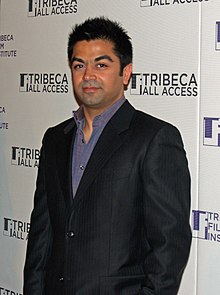Ashwin Navin
This article includes a list of general references, but it lacks sufficient corresponding inline citations. (December 2009) |
This article's use of external links may not follow Wikipedia's policies or guidelines. (October 2015) |
Ashwin Navin | |
|---|---|
 | |
| Known for | Former President and Co-Founder of BitTorrent, Inc. |
Ashwin Navin is CEO and co-founder of Samba TV, a data and analytics service that measures television viewership using data from social media, connected devices and set-top boxes. The company has been compared to more traditional TV measurement firms like Nielsen which rely on the people meter to gather viewership data. [1]
Prior to Samba TV, Navin was the president and co-founder of BitTorrent, Inc. He joined Bram Cohen, the inventor of BitTorrent, in 2004 and reportedly handled business and company-related matters while Cohen focused on engineering and product development. According to a post on his blog, Navin has resigned from BitTorrent in order to focus on his new venture Samba TV, and his new venture capital fund i/o Ventures.
Before BitTorrent, Navin was employed at Yahoo! from 2002 to 2004 in its Corporate Development group which handled corporate strategy and acquisitions. Before Yahoo!, Navin worked on Wall Street with Goldman Sachs and Merrill Lynch both as an investment banker and research analyst. Navin is a 1999 graduate of Claremont McKenna College with a dual B.A. in Government and Economics.
In 2000, Navin helped start a technology-based financial services company called Epoch Partners. Epoch was essentially the investment banking arm of several online stock brokerages including Charles Schwab, Ameritrade, and TD Waterhouse. Epoch Partners was eventually acquired by Goldman Sachs in 2001.
Navin reportedly evaluated Cohen's invention for Yahoo! in 2004. Although it was a notable development for the Internet, BitTorrent was widely considered to be the bane of the film industry, because it made the cost of transferring large files, including unlicensed film copies, negligible to the end user.
Commercializing BitTorrent

Cohen entrusted Navin with the responsibility of crafting a business model for BitTorrent with hopes of bringing BitTorrent out of the fringes and into the mainstream. Navin has assumed the public face of the company as an evangelist for its commercial viability. In 2007, Navin launched 3 commercial products: the BitTorrent Entertainment Network in February, the BitTorrent SDK in June, and BitTorrent DNA in October. As the foundation for these products, in 2006 Navin acquired uTorrent[1] which is the largest Torrent client in the world, outside China.[2][3] To catalyze BitTorrent's commercialization, Navin began by engaging movie industry executives directly. Although predicted by many to be highly unlikely, BitTorrent has struck relationships with many major media companies including Warner Brothers, 20th Century Fox, Paramount Pictures, MTV, Lionsgate, Kadokawa Pictures, and others [2] [3] The BitTorrent Entertainment Network, features mainstream movies and TV shows licensed from major media companies delivered with the BitTorrent protocol.
Navin has also announced the availability of a P2P content delivery service called BitTorrent DNA. According to him, "The Internet has become an essential source of entertainment for everything from music, games to TV shows, and even high-definition movies. Given the rapidly growing BitTorrent network, we already have the broadcast infrastructure in place that effectively multiplies the scale of the existing Internet to handle the next wave of content distribution. Implementing BitTorrent DNA on top of legacy infrastructure has the profound impact of allowing our customers to deliver a better user experience, higher quality video, faster software downloads, all with the security and reliability of a managed service."
Beyond copyright issues, BitTorrent also faced struggles with Cable companies and ISPs which were overwhelmed with high volumes of P2P traffic on their networks. In the wake of FCC hearings that pitted Comcast and BitTorrent against each other for traffic management policies that inhibited P2P file transfers, Navin was responsible for striking a deal with Comcast that resolved the companies' differences and defused a hotly contested issue at the heart of the Network Neutrality debate.
References
- ^ Schofield, Jack (8 December 2006). "BitTorrent buys uTorrent". Guardian technology blog. The Guardian. Retrieved May 25, 2012.
- ^ Andre Yoskowitz (15 August 2009). "uTorrent remains top BitTorrent client". AfterDawn. Retrieved May 25, 2012.
- ^ Ernesto (December 4, 2009). "Thunder Blasts uTorrent's Market Share Away". TorrentFreak. Retrieved May 25, 2012.
Sources
- Samba TV publicly launches its television ratings and analysis service.
- NewTeeVee reporting on Ashwin Navin's new startup Flingo
- TechCrunch interview with Ashwin Navin and Paul Bragiel, founding partners of i/o Ventures
- TechCrunch profile of Navin's venture fund i/o Ventures
- Ashwin Navin's blog post on his resignation from BitTorrent
- Navin on the role of BitTorrent and its commercialization
- Navin addresses the issue of Comcast traffic shaping P2P traffic in this video
External links
- NPR's All Things Considered interviews Ashwin Navin
- Ashwin Navin Speaking at Stanford
- An article from sfgate.com
- Podcast with Navin's views on the Download business and DRM
- Podcast with Navin's views on BitTorrent in China
- Navin challenges the decision of Ohio University' administration to ban P2P technologies
- Navin addressing the deal his company negotiated with Comcast
